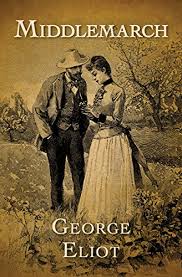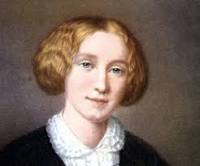Middlemarch Page #20
Middlemarch, A Study of Provincial Life is a novel by the English author George Eliot, appearing in eight instalments in 1871 and 1872. Set in a fictitious Midlands town from 1829 to 1832, it follows distinct, intersecting stories with many characters.
Mr. Cadwallader was a large man, with full lips and a sweet smile; very plain and rough in his exterior, but with that solid imperturbable ease and good-humor which is infectious, and like great grassy hills in the sunshine, quiets even an irritated egoism, and makes it rather ashamed of itself. “Well, how are you?” he said, showing a hand not quite fit to be grasped. “Sorry I missed you before. Is there anything particular? You look vexed.” Sir James’s brow had a little crease in it, a little depression of the eyebrow, which he seemed purposely to exaggerate as he answered. “It is only this conduct of Brooke’s. I really think somebody should speak to him.” “What? meaning to stand?” said Mr. Cadwallader, going on with the arrangement of the reels which he had just been turning. “I hardly think he means it. But where’s the harm, if he likes it? Any one who objects to Whiggery should be glad when the Whigs don’t put up the strongest fellow. They won’t overturn the Constitution with our friend Brooke’s head for a battering ram.” “Oh, I don’t mean that,” said Sir James, who, after putting down his hat and throwing himself into a chair, had begun to nurse his leg and examine the sole of his boot with much bitterness. “I mean this marriage. I mean his letting that blooming young girl marry Casaubon.” “What is the matter with Casaubon? I see no harm in him—if the girl likes him.” “She is too young to know what she likes. Her guardian ought to interfere. He ought not to allow the thing to be done in this headlong manner. I wonder a man like you, Cadwallader—a man with daughters, can look at the affair with indifference: and with such a heart as yours! Do think seriously about it.” “I am not joking; I am as serious as possible,” said the Rector, with a provoking little inward laugh. “You are as bad as Elinor. She has been wanting me to go and lecture Brooke; and I have reminded her that her friends had a very poor opinion of the match she made when she married me.” “But look at Casaubon,” said Sir James, indignantly. “He must be fifty, and I don’t believe he could ever have been much more than the shadow of a man. Look at his legs!” “Confound you handsome young fellows! you think of having it all your own way in the world. You don’t understand women. They don’t admire you half so much as you admire yourselves. Elinor used to tell her sisters that she married me for my ugliness—it was so various and amusing that it had quite conquered her prudence.” “You! it was easy enough for a woman to love you. But this is no question of beauty. I don’t like Casaubon.” This was Sir James’s strongest way of implying that he thought ill of a man’s character. “Why? what do you know against him?” said the Rector laying down his reels, and putting his thumbs into his armholes with an air of attention. Sir James paused. He did not usually find it easy to give his reasons: it seemed to him strange that people should not know them without being told, since he only felt what was reasonable. At last he said— “Now, Cadwallader, has he got any heart?” “Well, yes. I don’t mean of the melting sort, but a sound kernel, that you may be sure of. He is very good to his poor relations: pensions several of the women, and is educating a young fellow at a good deal of expense. Casaubon acts up to his sense of justice. His mother’s sister made a bad match—a Pole, I think—lost herself—at any rate was disowned by her family. If it had not been for that, Casaubon would not have had so much money by half. I believe he went himself to find out his cousins, and see what he could do for them. Every man would not ring so well as that, if you tried his metal. You would, Chettam; but not every man.” “I don’t know,” said Sir James, coloring. “I am not so sure of myself.” He paused a moment, and then added, “That was a right thing for Casaubon to do. But a man may wish to do what is right, and yet be a sort of parchment code. A woman may not be happy with him. And I think when a girl is so young as Miss Brooke is, her friends ought to interfere a little to hinder her from doing anything foolish. You laugh, because you fancy I have some feeling on my own account. But upon my honor, it is not that. I should feel just the same if I were Miss Brooke’s brother or uncle.” “Well, but what should you do?” “I should say that the marriage must not be decided on until she was of age. And depend upon it, in that case, it would never come off. I wish you saw it as I do—I wish you would talk to Brooke about it.” Sir James rose as he was finishing his sentence, for he saw Mrs. Cadwallader entering from the study. She held by the hand her youngest girl, about five years old, who immediately ran to papa, and was made comfortable on his knee. “I hear what you are talking about,” said the wife. “But you will make no impression on Humphrey. As long as the fish rise to his bait, everybody is what he ought to be. Bless you, Casaubon has got a trout-stream, and does not care about fishing in it himself: could there be a better fellow?” “Well, there is something in that,” said the Rector, with his quiet, inward laugh. “It is a very good quality in a man to have a trout-stream.” “But seriously,” said Sir James, whose vexation had not yet spent itself, “don’t you think the Rector might do some good by speaking?” “Oh, I told you beforehand what he would say,” answered Mrs. Cadwallader, lifting up her eyebrows. “I have done what I could: I wash my hands of the marriage.” “In the first place,” said the Rector, looking rather grave, “it would be nonsensical to expect that I could convince Brooke, and make him act accordingly. Brooke is a very good fellow, but pulpy; he will run into any mould, but he won’t keep shape.” “He might keep shape long enough to defer the marriage,” said Sir James. “But, my dear Chettam, why should I use my influence to Casaubon’s disadvantage, unless I were much surer than I am that I should be acting for the advantage of Miss Brooke? I know no harm of Casaubon. I don’t care about his Xisuthrus and Fee-fo-fum and the rest; but then he doesn’t care about my fishing-tackle. As to the line he took on the Catholic Question, that was unexpected; but he has always been civil to me, and I don’t see why I should spoil his sport. For anything I can tell, Miss Brooke may be happier with him than she would be with any other man.”
Translation
Translate and read this book in other languages:
Select another language:
- - Select -
- 简体中文 (Chinese - Simplified)
- 繁體中文 (Chinese - Traditional)
- Español (Spanish)
- Esperanto (Esperanto)
- 日本語 (Japanese)
- Português (Portuguese)
- Deutsch (German)
- العربية (Arabic)
- Français (French)
- Русский (Russian)
- ಕನ್ನಡ (Kannada)
- 한국어 (Korean)
- עברית (Hebrew)
- Gaeilge (Irish)
- Українська (Ukrainian)
- اردو (Urdu)
- Magyar (Hungarian)
- मानक हिन्दी (Hindi)
- Indonesia (Indonesian)
- Italiano (Italian)
- தமிழ் (Tamil)
- Türkçe (Turkish)
- తెలుగు (Telugu)
- ภาษาไทย (Thai)
- Tiếng Việt (Vietnamese)
- Čeština (Czech)
- Polski (Polish)
- Bahasa Indonesia (Indonesian)
- Românește (Romanian)
- Nederlands (Dutch)
- Ελληνικά (Greek)
- Latinum (Latin)
- Svenska (Swedish)
- Dansk (Danish)
- Suomi (Finnish)
- فارسی (Persian)
- ייִדיש (Yiddish)
- հայերեն (Armenian)
- Norsk (Norwegian)
- English (English)
Citation
Use the citation below to add this book to your bibliography:
Style:MLAChicagoAPA
"Middlemarch Books." Literature.com. STANDS4 LLC, 2024. Web. 25 Nov. 2024. <https://www.literature.com/book/middlemarch_242>.




Discuss this Middlemarch book with the community:
Report Comment
We're doing our best to make sure our content is useful, accurate and safe.
If by any chance you spot an inappropriate comment while navigating through our website please use this form to let us know, and we'll take care of it shortly.
Attachment
You need to be logged in to favorite.
Log In